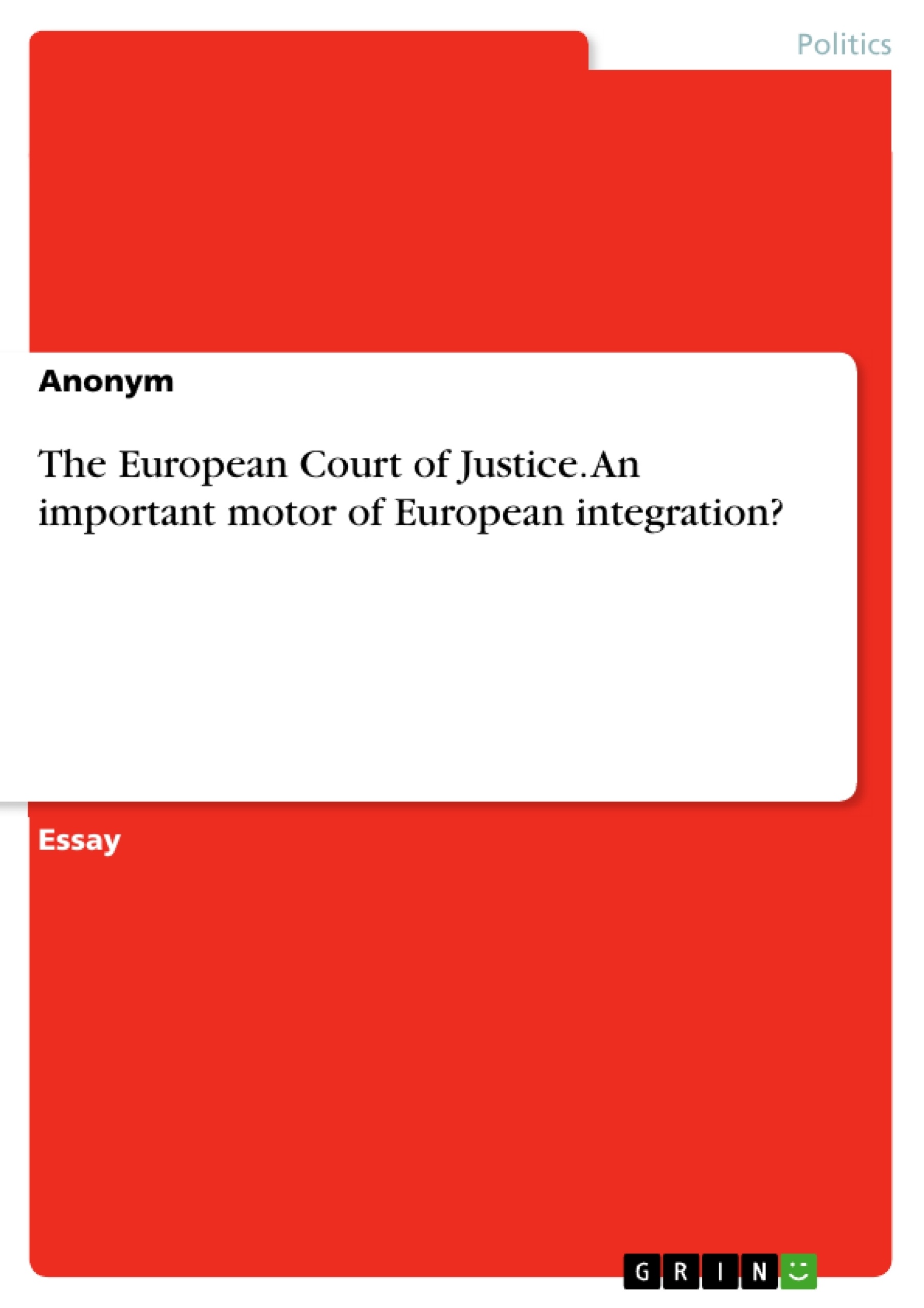The question of the role of the European Court of Justice (ECJ) in the process of European integration has been a matter of long-standing academic dispute between neo-functionalists
and intergovernmentalists. In this essay it will be argued that the ECJ can be seen as an engine of European integration but the court – founded along with the other core institutions of the
European Union (EU) in the 1950s – depends on the assistance of other actors. The explanation of this assertion is unfolded in three steps. At first this paper will provide a brief overview of neo-functionalism and intergovernmentalism and their dispute concerning the ECJ. Secondly, the ‘magic triangle’ (Vauchez 2008, p. 8) consisting of ‘direct effect’, ‘supremacy’ and ‘preliminary ruling’ – which allows the ECJ to have an impact on the integration process – will be examined and it will be explained why these three mentioned rules are so important for the European legal order. Thirdly, it is claimed that there are limits of the court’s judicial law-making and thus its role in the process of European integration should not be overestimated.
Inhaltsverzeichnis (Table of Contents)
- The European Court of Justice and European Integration
- Neo-functionalism and Intergovernmentalism
- The ‘Magic Triangle' of European Law
- Limits of the Court's Judicial Law-Making
Zielsetzung und Themenschwerpunkte (Objectives and Key Themes)
This essay examines the role of the European Court of Justice (ECJ) in the process of European integration, a topic debated by neo-functionalists and intergovernmentalists. It argues that the ECJ acts as a driving force for integration but relies on other actors for its effectiveness.
- The historical development of the European Union and the role of national governments versus supranational institutions
- The impact of the ECJ's jurisprudence on European integration through concepts like direct effect, supremacy, and preliminary rulings
- The limits of the ECJ's judicial law-making and the influence of other actors on its effectiveness
- The interplay between legal and political considerations in the European integration process
- The role of the ECJ in shaping the EU's legal order and its impact on member states' sovereignty
Zusammenfassung der Kapitel (Chapter Summaries)
- The essay begins by introducing the debate between neo-functionalism and intergovernmentalism regarding the role of the ECJ in European integration. It highlights the different perspectives on the court's influence and autonomy.
- The second part examines the "magic triangle" of direct effect, supremacy, and preliminary rulings, explaining how these principles empower the ECJ to shape the EU's legal order. It explores how these doctrines have facilitated integration by granting individuals rights and obligations under EU law.
- The third part acknowledges that the ECJ's influence is not absolute. It discusses the limitations of the court's judicial law-making, emphasizing the need for cooperation and compliance from member states. It also highlights the impact of political considerations on the court's decisions and the potential for implementation problems.
Schlüsselwörter (Keywords)
The essay focuses on key concepts such as European integration, the European Court of Justice, neo-functionalism, intergovernmentalism, direct effect, supremacy, preliminary rulings, judicial law-making, member state sovereignty, and the interplay between legal and political factors in the EU.
Frequently Asked Questions
What is the role of the European Court of Justice (ECJ) in European integration?
The ECJ acts as a driving force or "engine" of European integration by shaping the EU's legal order through its jurisprudence, although it depends on the cooperation of other actors to be effective.
What are the two main academic theories debating the ECJ's influence?
The debate is primarily between neo-functionalism, which emphasizes the court's autonomy and influence, and intergovernmentalism, which focuses on the continued dominance of national governments.
What is the "magic triangle" of European law?
The "magic triangle" consists of three key legal principles: direct effect, supremacy of EU law, and preliminary rulings, which together empower the ECJ to influence national legal systems.
What does "direct effect" mean in EU law?
Direct effect allows individuals to invoke European law directly before national courts, granting them rights and obligations that member states must respect.
Are there limits to the ECJ's power?
Yes, the ECJ's judicial law-making is limited by the need for compliance from member states and the influence of political considerations, meaning its power should not be overestimated.
How do preliminary rulings facilitate integration?
Preliminary rulings allow national courts to ask the ECJ for interpretations of EU law, ensuring uniform application across all member states and strengthening the EU legal framework.
- Quote paper
- Anonym (Author), 2016, The European Court of Justice. An important motor of European integration?, Munich, GRIN Verlag, https://www.grin.com/document/324284



